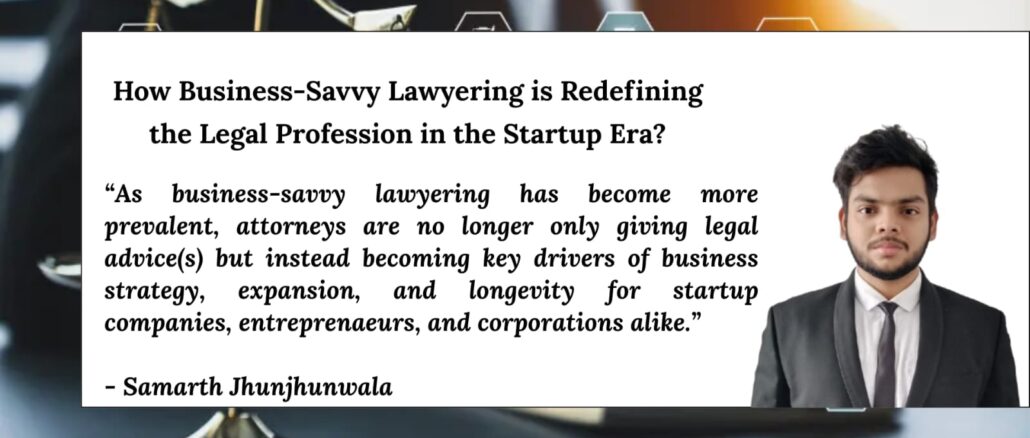

Written By Samarth Jhunjhunwala[1]
In an era where innovation, disruption, and startups rule the corporate world, law professionals are increasingly taking a step beyond conventional roles and finding their place in the world of entrepreneurship. Legal entrepreneurship is basically no longer a buzzword; it is basically turning into a new reality for lawyers. As business-savvy lawyering has become more prevalent, attorneys are no longer only giving legal advice(s) but instead becoming key drivers of business strategy, expansion, and longevity for startup companies, entrepreneurs, and corporations alike.
Traditionally, lawyers have been seen as counsel of trust, helping companies maneuver complicated legal structures, negotiating contracts, and maintaining regulatory compliance. Although these responsibilities are still relevant, the legal landscape is basically changing, and the conventional law practice model can no longer cater to the needs of today’s rapid and dynamic business climate.
Legal entrepreneurship is basically where law and business intersect. It has lawyers using their legal knowledge to build, run, and expand businesses or ventures, usually in the realm of startups, tech, and corporate innovation. Lawyers who adopt this path are not just familiar with the intricacies of corporate law, intellectual property, and commercial contracts but have intimate knowledge of the market dynamics, fundraising techniques, and the specific challenges that entrepreneurs encounter. Rather than just coping with legal risk, they are involved in the actual formation of business strategy ensuring that their clients’ legal frameworks are optimized for growth and success.
Why Business-Savvy Lawyers Are Hot?
-
Startups and Entrepreneurs Require More Than Legal Guidance Alone
Startups of today exist in a world where velocity, flexibility, and creativity are essential for survival. Old-fashioned law firms, with their cookie-cutter approaches, tend to neglect the special needs of entrepreneurs. In comes the business-savvy lawyer, a legal expert who recognizes the value of nimbleness, business intelligence, and rapid decision-making. A skilled business law attorney can provide the specialized legal support needed to balance compliance with innovation.
Attorneys who possess a robust knowledge of business strategy and the entrepreneurial ecosystem are better placed to advise clients not only on the legal aspect, but on structuring deals, raising funds, and safeguarding intellectual property in a manner that is consistent with the vision and growth aims of the company.
-
The emergence of Legal Tech and Innovation
The legal industry is not exempt from the tide of technology and innovation that is engulfing all industries. Legal tech, encompassing automation software, AI-enabled contract review tools, and blockchain-based tools, is revolutionizing the delivery of legal services. Business-minded attorneys are driving this revolution, embracing technology in their practice to enhance efficiency, lower costs, and bring value to clients.
Additionally, with technology merging more and more with business, attorneys must remain ahead of the curve on trends like data privacy, cybersecurity, and software and tech startup intellectual property law. Lawyers who understand business are not only counseling on the law surrounding these technologies but are assisting tech founders in navigating intricate rules in an ever-changing digital environment.
-
Understanding Business Models and Revenue Streams
One of the key elements of business-savvy lawyering is comprehension of the different business models that entrepreneurs employ in order to capitalize on their concepts. Attorneys who possess a strong appreciation for marketplace dynamics, revenue streams, and sources of financing can provide advice that transcends legal guidance. They can assist investors, founders, and entrepreneurs in crafting deals that are not only legally valid but also strategically advantageous.
-
Establishing a Personal Brand as a Legal Entrepreneur
In the modern-day competitive legal landscape, attorneys are becoming entrepreneurs in their own right. Most attorneys are creating personal brands that both convey their knowledge in the area of law and business. Social media sites, blogs, podcasts, and public speaking are all great vehicles for lawyers to demonstrate their competency. By passing on knowledge about legal entrepreneurship and establishing themselves as a business-savvy lawyer, they can attract high-end clients and establish their own entrepreneurial businesses in the law sector.
As more lawyers adopt an entrepreneurial mindset, the future of the legal profession seems destined for change. By embracing the role of business partners and strategic advisors, lawyers are able to foster closer, more meaningful relationships with their clients and contribute directly to the success of the ventures they serve.
For startups and entrepreneurs, having a business-savvy lawyer on board can be a game-changer. Lawyers who understand both the legal and business aspects of running a company can help entrepreneurs make informed decisions, avoid costly mistakes, and build a solid foundation for growth.
Moreover, as legal entrepreneurship grows in prominence, law schools are beginning to adapt their curricula to meet the needs of the modern legal entrepreneur. By incorporating more business law courses, startup law, and entrepreneurial thinking, law students will be better prepared to enter the world of legal entrepreneurship and capitalize on these new opportunities.
In doing so, they are not only reshaping the legal landscape but are also opening doors to a new era of innovative, dynamic, and entrepreneurial legal practice. For lawyers willing to embrace this evolution, the future holds endless possibilities.
[1] Samarth Jhunjhunwala is a dynamic young legal professional and entrepreneur, passionate about bridging the gap between law and business. A 2025 graduate from Bennett University – The Times Group, Greater Noida, he holds a B.A., LL.B. (Hons.) degree, with a focused interest in Business Law and Commercial Transactions.

